‘Funny, Ballsy, Disregarded, and Hardworking’: How the 'Hacks' Showrunners Made Deborah Vance
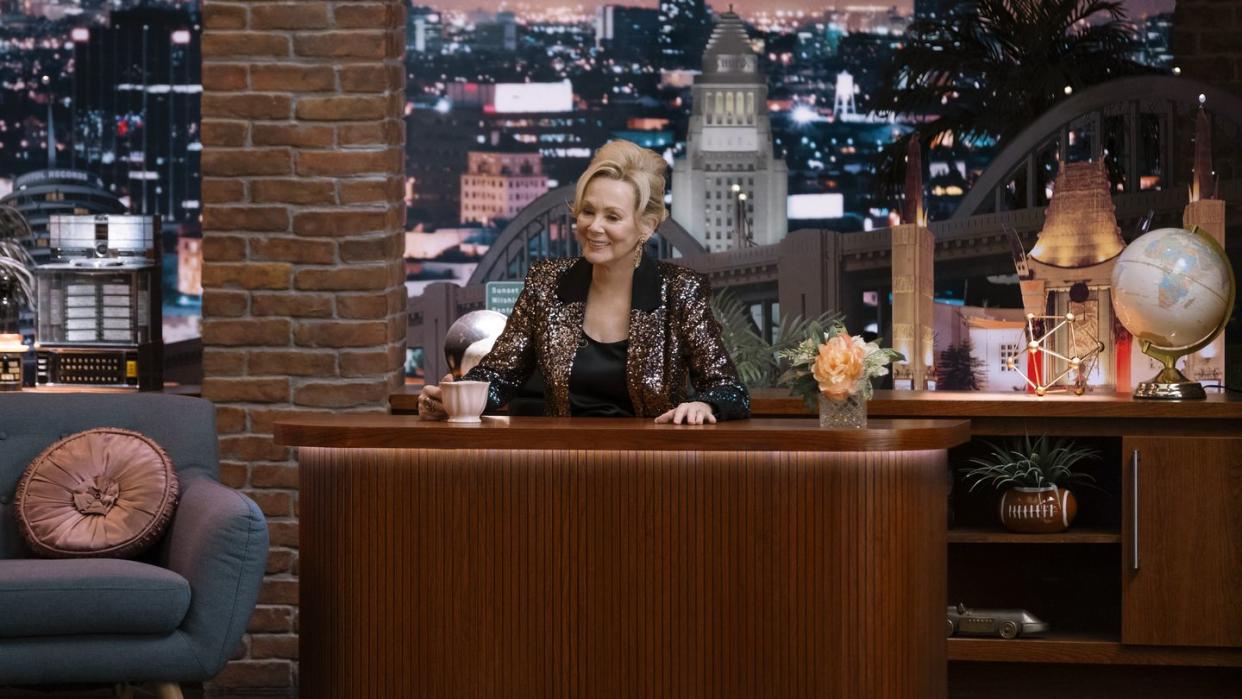
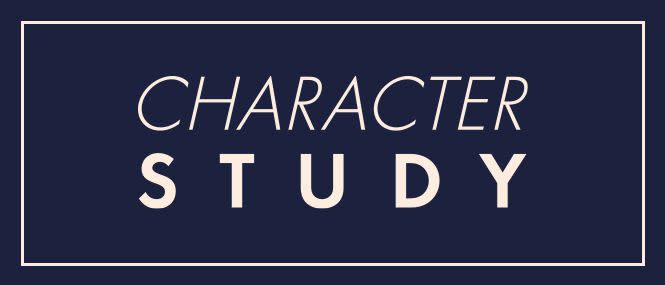
In ELLE.com’s recurring feature Character Study, we ask the creators behind our favorite shows to go deep about what went into creating their memorable characters: the original idea behind them, how they were tailored to the actor, and elements of them we might not see on the screen.
When Jean Smart vaulted onto TV screens as Deborah Vance, she was fully realized. So much so that there was some confusion, Hacks co-showrunner Paul W. Downs recalls. “Somebody said to a friend of ours, ‘I had no idea about Deborah Vance’s career until I started watching the show,’ as if it was a real comedian,” he says. “We were like, ‘That’s very nice. But yeah, she’s fictional.’”
You can know that and still doubt it at times, as Smart inhabits the character so beautifully. In the third season, which draws to a close today, Deborah has a second chance to become a late night host, a dream she abandoned decades earlier. The resulting storyline reveals heartbreaking facts about her past and the wounds that have been fueling her. Hacks’ creators and showrunners spoke with ELLE.com about growing a very fully-formed character over the course of three seasons.
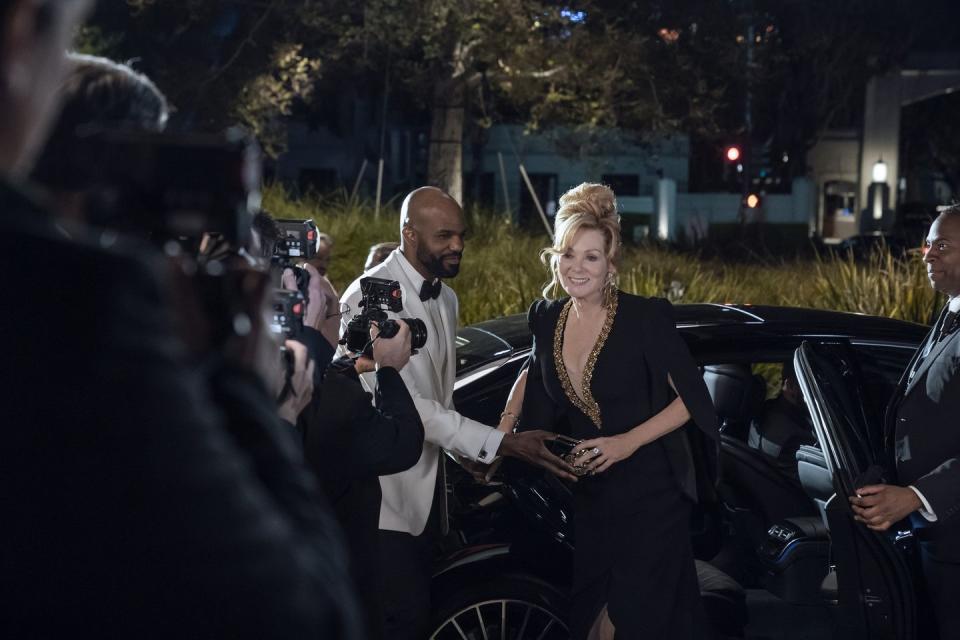
How did you conceive this character? When you first started thinking about the show, what were her core qualities?
Lucia Aniello: Funny.
Paul W. Downs: Ballsy.
Jen Statsky: Maneuver-y, maneuvering. Incredibly hardworking.
Downs: But I want to add one.
Aniello: Blonde.
Downs: I don’t want to say maligned, but I’m looking for a word that means suffered indignities.
Aniello: Maybe do disrespected.
Downs: Disregarded. That’s nice. Funny, ballsy, disregarded, and hardworking.
Statsky: And then parentheses, blonde.
Aniello: We always said there’s a lot of blonde people on TV.
You’ve got to get a tall blonde on.
Downs: They have fun and we want to show it.
How much has the affair between her husband and sister shaped her when the show begins.
Downs: That was a trauma that really informs a lot of the character and her relationships. And because she lost this white whale, which was late night, it also informs the chip that she has on her shoulder and this lost dream. Even if she achieves great wealth and great success, that was the ring that was always out of reach.
Aniello: You see it when she says, “I made this joke about this house fire. That was this huge story. And I leaned into it and I realized people would rather laugh at me than believe me.” That’s the inciting incident where she leaned into being a joke. She leaned into making fun of herself, and she participated in the disregarding of herself, sadly.
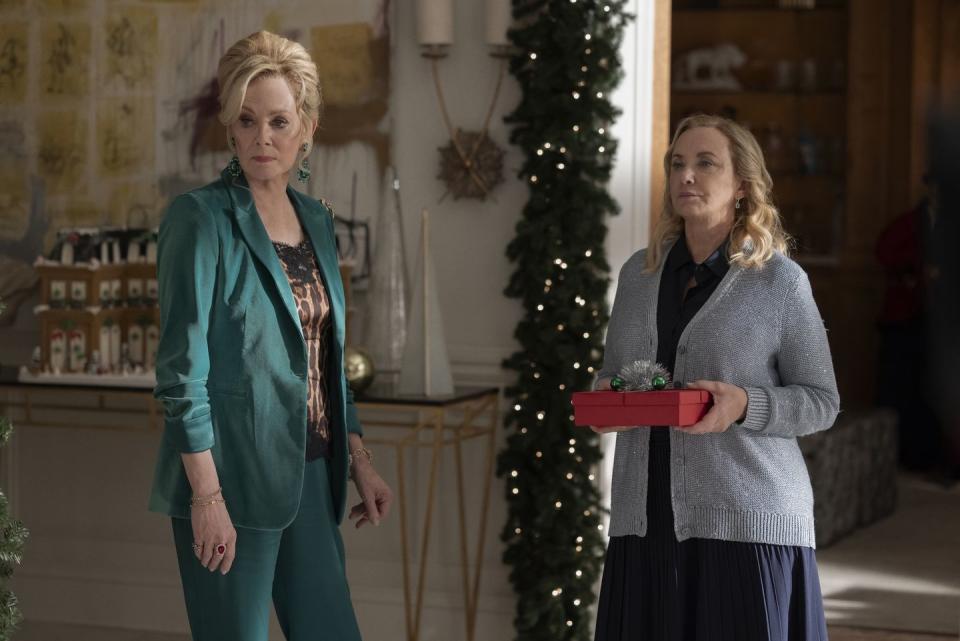
What was her relationship with her sister like growing up?
Downs: I think they were very close. The way that we’ve always envisioned it is that, especially because of the house that she grew up in with her dad being a drinker, she was a protector of her sister. Her sister was younger than her and I think there was a little bit of a maternal quality, especially as we established in the show that they lost their parents early.
There was a real closeness there, but there was also a little bit of infantilizing of her sister by Deborah. That sort of Mother Hen-ing also informed a little bit of their dynamic.
Aniello: I think that they were very close and they bonded over living in this chaotic household. But at the same time, Deborah is someone who is the brightest light in the room. She’s the star.
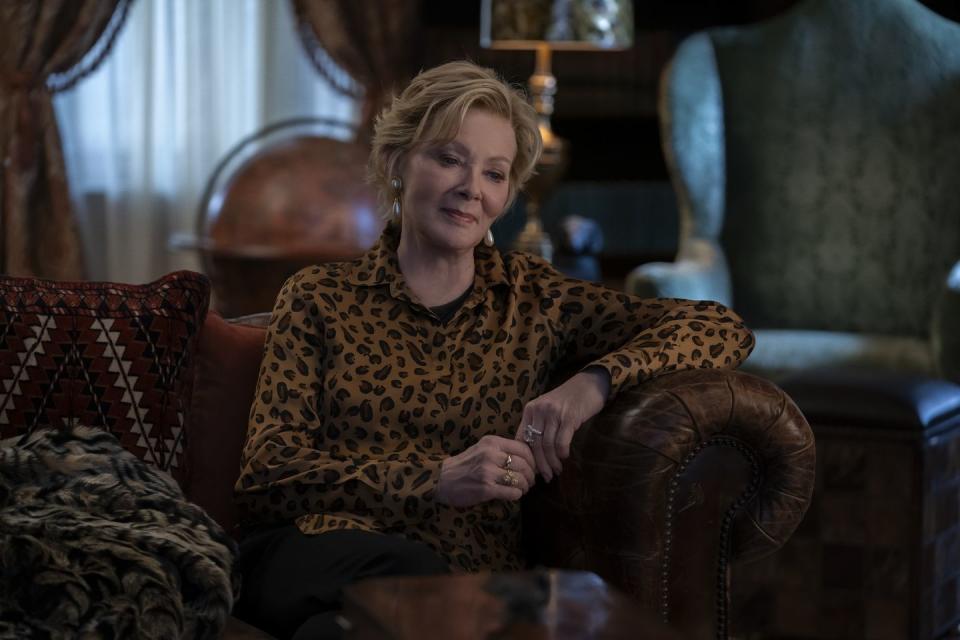
Taking her parents away from the mausoleum is so fascinating.
Aniello: Were you like, “damn?”
When you say ballsy, it’s like, Jesus, wow, what a move.
Aniello: That is her.
How do you think Deborah’s relationship to DJ shifts as she’s becoming a mother? Do you think she realizes the ways in which she let her down?
Aniello: Even in the special, she acknowledged the ways that she let her down. Her goal was always to have DJ with her at all times, for better or worse. She grew up in comedy clubs, she didn’t necessarily have the best influences. She knows those mistakes were made, but that still doesn’t stop her from thinking that DJ’s incapable because DJ hasn’t ever really truly grown up.
Now that DJ is pregnant, I think Deborah feels like, “Okay, well, I have to take care of her in doing this.” We evolved DJ as a character to a place where she has grown a lot. She now is five years sober. She has what we believe is a pretty functional relationship with her husband. And Deborah can’t see her in any other way other than a dysfunctional daughter.
In episode 3, DJ is actually able to see the truth of Deborah, which is that Deborah is addicted to laughs and she’s just as much of an addict as DJ is and they share addiction in that way. In some ways now, psychologically, DJ is maybe even eclipsing Deborah in some ways and seeing things that Deborah can’t even see about herself.
Do you think there are ways in which Deborah’s relationship with her daughter is a factor in how she relates to Ava?
Downs: No. Ava is such a unique figure in her life, she’s her creative partner. I think probably for Ava and Deborah, it’s weird for them because yes, they are generations apart and the ages of mother-daughters. Ava obviously has a strange relationship with her mother. I think there’s probably a little bit of grief around the fact that it’s like, “Wow, how can I really get along with this person who’s the generation of my daughter or my mother, but I don’t with the person who’s actually related to me?” But I don’t think that Deborah feels motherly [towards] Ava.
I think you see how Deborah has grown when she leaves the colonoscopy party because of something she understands better because of Ava.
Aniello: They’re very much mentoring each other. They’re in each other’s heads in many ways, both artistic ways and in things about the world. You do see Deborah’s growth in that way that she can’t get Ava out of her head. It’s not just that Ava’s said it to her. Deborah’s internalized it, and she does now believe it too. There’s great growth on her part because that is not the person we met in season 1.
When videos of Deborah’s problematic past jokes get her in trouble, Ava, who was in a similar situation at the beginning of the show, is guiding her through that.
Aniello: Ava says to her, “I know this,” or she starts to say, and I think Deborah cuts her off, “I know this seems like the worst thing in the world, but it’s really not.” That’s exactly what is said to Ava in the pilot episode.
Downs: At that café when she’s like, “Hey, I just need a job.” And the girl’s like, “I know this seems like it’s the worst thing in the world—”
Aniello: “But it’s really not.” And so they’re certainly mirroring Ava’s experience to what Deborah is dealing with.
Statsky: I do think Ava has done that kind of self-exploration and understands really more now how to take responsibility for her actions in a way that Deborah is still coming to grips with.
Aniello: Right.
Downs: Even for someone Ava’s generation, I think the first instinct is to be self-protective and dig your heels in, be defensive and say, “No, this is not fair.” Deborah’s been there too. As she said, she was canceled before there was a name for it. The bad press and all of it around her divorce were the things that made her radioactive. She had a really tough time. So she’s like, “I’ve been there.” But the way that she thinks to deal with it is the way that people her generation learned, just to go to Europe for a few months.
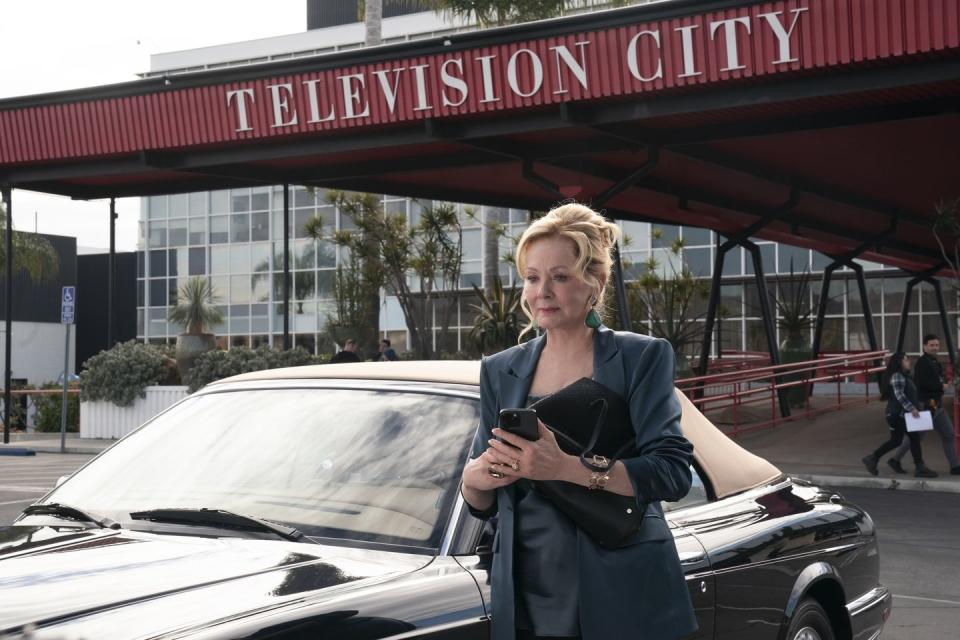
When you cast Jean, did she shape the character at all? Were there qualities of Deborah that came about specifically because of Jean?
Aniello: There’s certainly some Jean quirks that we’ve incorporated just because we find them humorous. She loves Christmas so much.
Downs: Loves Christmas. Deborah adopted that, yeah.
Aniello: Jean’s ability to scream and be really funny screaming led us to write more Deborah screams. So, in that way there’s been adjustments. But I think in general, what’s been one of the amazing things about making the show is how seamlessly Jean fit into the glove that is Deborah Vance—the sequined fingerless glove that is Deborah Vance—and how it just felt magical from the first moment.
Her clothes and the way she puts herself together, where did that come from?
Downs: I mean, Kathleen Felix-Hager, who’s our incredible costume designer, really had a vision for Deborah. Totally understood her. She’s a Vegas comedian and she has her show looks, but we always wanted her to feel grounded and well-observed and idiosyncratic. The way that Kathleen shops for her and dresses her is so perfect. She’ll shop thrift and vintage. She’ll buy new stuff, but it’s all really quality, really high-end, really the stuff that someone like Deborah would buy.
But also there’s costume jewelry pieces. It’s I think exactly what this character would do. She’d save money here and there, and then she would spend $900 on a silk blouse because it’s well-made and it’s a classic.
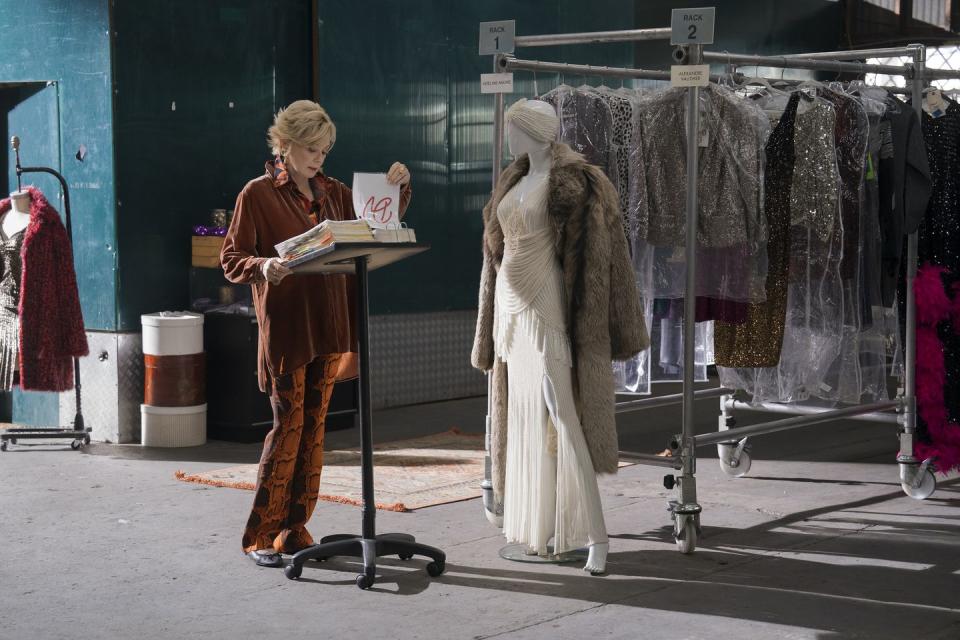
How did you come up with her name?
Downs: We talked about a lot of names, but it felt so right.
Aniello: Yeah. We were just pitching the three of us on what it would be.
Statsky: And Vance is our friend’s last name and we’ve kind of always thought that was a good last name for the character.
Aniello: And Deborah just, I think, felt right to the time.
Downs: For the time and this period.
Statsky: It felt regal, kind of.
This interview has been edited and condensed for clarity.
You Might Also Like

 Yahoo News
Yahoo News 
